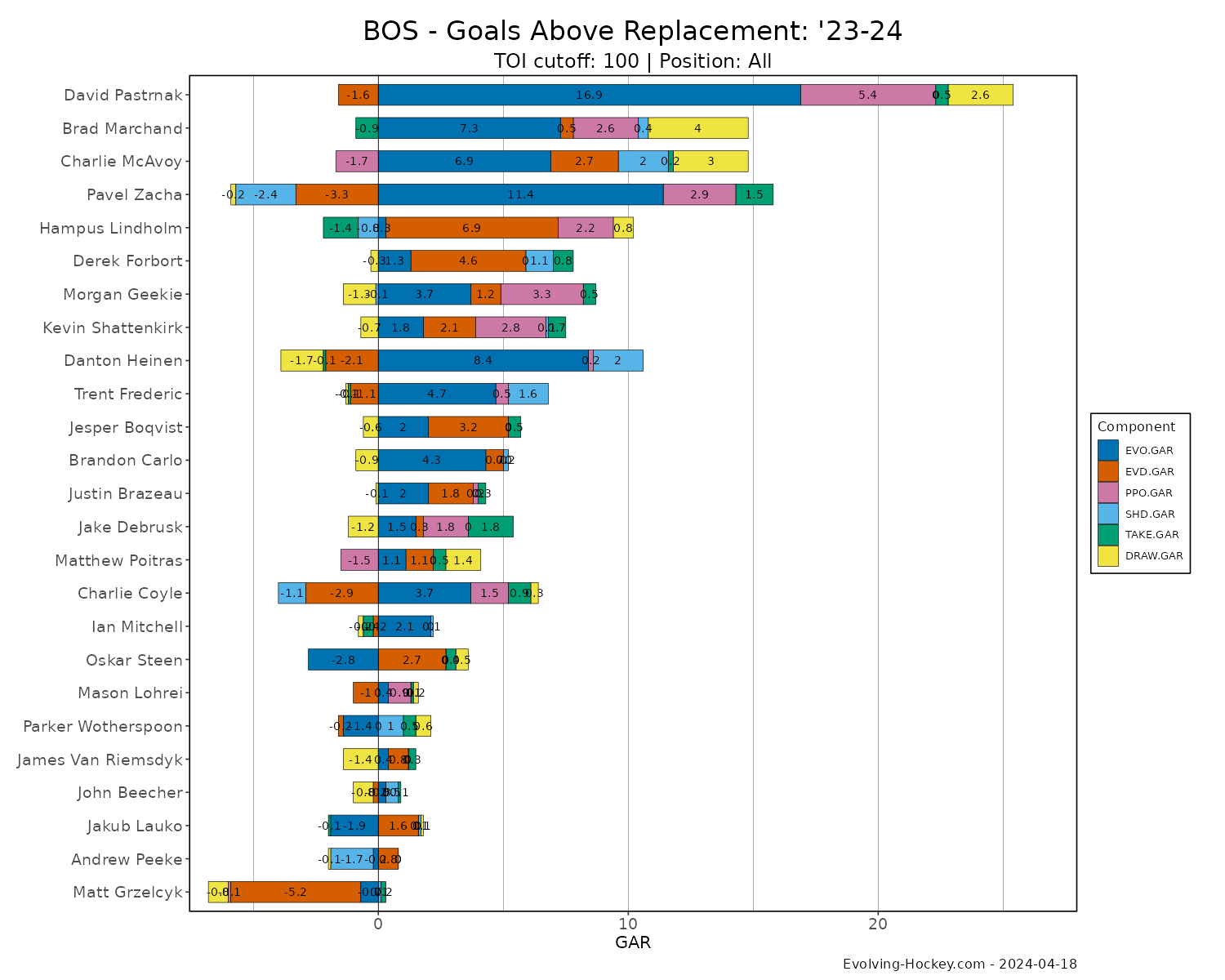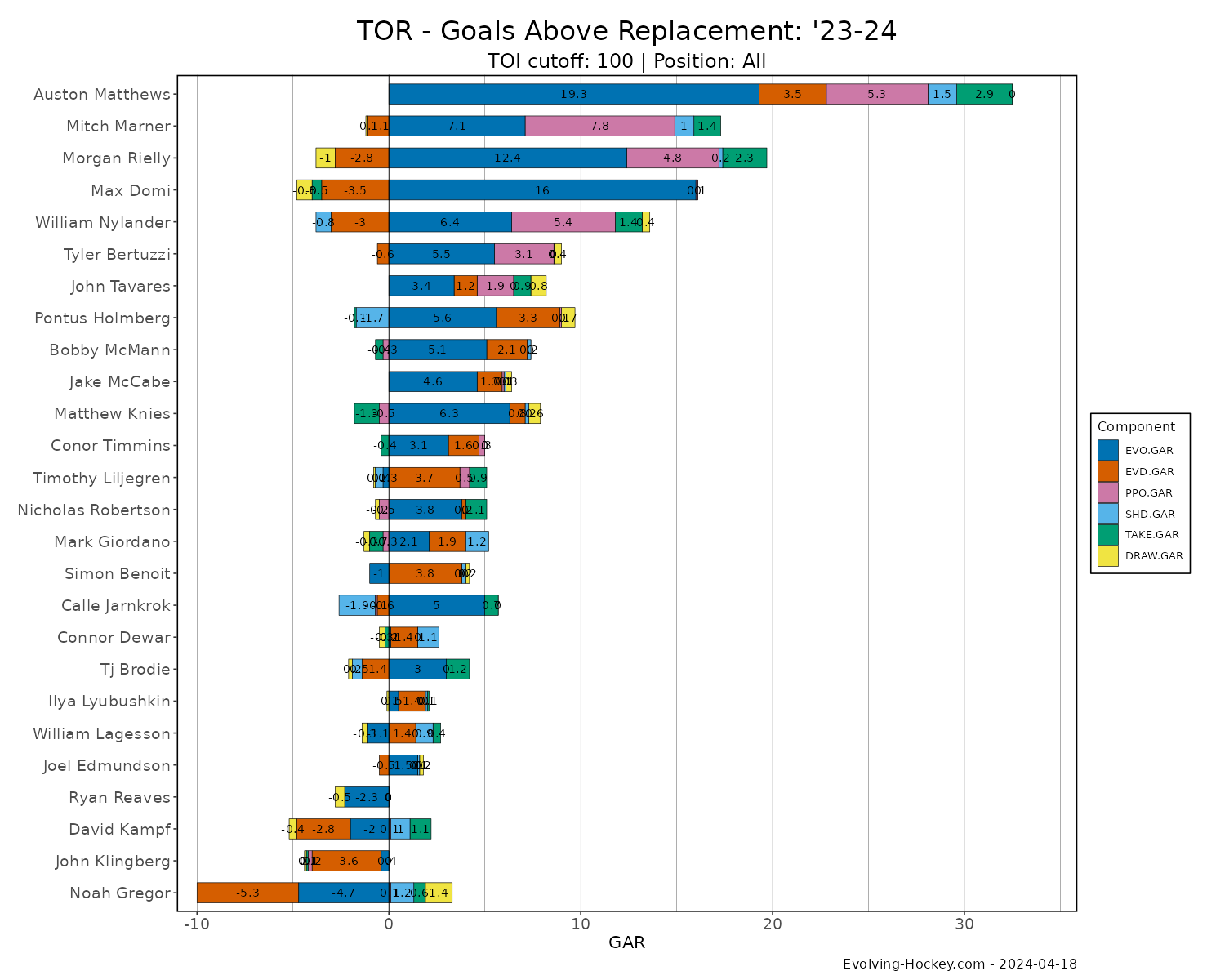I've been thinking I should write something about the Bruins. The actual Bruins, not the mythical and mystical brand-based version of the team that seems to live in people's heads. Is there a team with a brand identity stronger? One so strong it defies reality not just a little bit, but entirely. Even the New Jersey Devils rebuilt themselves out of their "boring defence" reputation. Can we ever see Boston for who they are now?
Tyler Bertuzzi put it succinctly:
Tyler Bertuzzi on facing Bruins in playoffs:
— Mark Masters (@markhmasters) April 18, 2024
"They play good as a team. Good goaltending. Obviously they have some top players that can score goals. We're excited to shut’em down."
I went back to the previews posted this season to see what I thought of Boston at various times.
In November:
It's not like the rest of the team has been low quality, but they don't dominate at five-on-five like the Bruins of a few years back. They actually need the hot goalie to carry on winning most of their games.
In December:
Their offence is a little tepid, but they are extremely hard to score against. They aren't as good as last year's team, but that doesn't mean they're bad.
In March I was clearly fed up with the branding being ascendant over reality:
We covered this team two days ago, but you remember it, right? A total juggernaut that has no flaws and is what a real team looks like.
Or, was it a weak five-on-five team with some good forwards and two very good goalies.
What I'd said two days prior was:
They put up good quality offence, have good systems an okay power play, but nothing like how it used to be. They aren't at all how they used to be. Their defence is tepid, and they are just okay at most things they used to excel at. They get by on goaltending and and that killer top line.
In that game, David Pastrnak was used as the second line wing and was very effective lurking there.
Season Results
Boston finished the season with the following rankings in key metrics (none of which are points):
Five on Five
Leafs ranking in brackets.
- Corsi %: 22nd (11th)
- Expected Goals %: 17th (9th)
- Expected Goals For per 60 minutes: 14th (6th)
- Expected Goals Against per 60 minutes: 14th (16th)
If you're surprised most by the Leafs rankings that's likely because as they got better in the second half of the season – which they did by a large margin over their early results – the idea that they were bad was fixed in peoples' minds. Add to that there is rarely any engagement to be had on social media with positive news about the Leafs and you were left thinking that this was the worst period of inflation and unemployment in living memory. Wait. That's not right. You were left thinking that the Leafs were the worst they've been ever. I know this is true, because many people have said the Leafs were bad on PPP over the last few months as the team got better, Samsonov stopped some pucks, and they won 11 in a row or whatever it was.
All Situations
Leafs ranking in brackets.
- Save %: 3rd (25th)
- Shooting %: 8th (6th)
Note: All-situations Save % is a measure of team goaltending and team defending with a lot of randomness thrown in because randomness is always there in every number. It is not a measure of goalie results in any way but a very general read.
Shooting % is a measure of shooter luck and skill so intertwined, it is impossible to separate.
Adding the two together and reading any number over 1.000 as lucky and conversely any number under as unlucky is a misunderstanding of the concept that at very large timescales, a team's Sh% + SV% will tend towards 1. If a team has a preponderance of shooting luck in either direction – something that rarely persists for a full season – it's obvious without bringing up the more skill-based Save % at all.
Power Play
Leafs ranking in brackets.
- Expected Goals For per 60: 14th (4th)
- Goals For per 60: 12th (6th)
Penalty Kill
Leafs ranking in brackets.
- Expected Goals Against per 60: 11th (13th)
- Goals Against per 60: 7th (23rd)
There is a meme that the Leafs are bad on the penalty kill, and while Expected Goals during special teams are a bit unreliable because of the small number of minutes played (the less time, the more powerful is randomness) those numbers look like goaltending is the difference.
Teams are not their average
While it's useful to look at season averages to measure how teams rate against each other, and where they are stronger or weaker, teams don't perform at their average. And particularly in the playoffs, the expectation should be that overall they will perform under their average since the competition no longer includes the Sharks.
Teams also don't perform at their average for other very good reasons. It's not valid to expect Ilya Samsonov to either return to his dreadful performance in December or be allowed to play if he does. Martin Jones, who is very unpredictable and has barely played this spring, is not likely to make an appearance, but if he does, I can't guess at his results. And while it's not clear how fast Joe Woll can get in the groove of playing regularly – or even if he will – his only problem this year has been an injury.
And don't forget that the Leafs basic metrics of Corsi and Expected Goals have not been static, and are better lately. That's no guarantee they'll stay better, but remember that in that average is the contribution of John Klingberg who I rank as the worst player to appear in the NHL this year in a high-minute role.
Meanwhile, the Bruins have been underperforming in a lot of ways lately, including in net.
Team and Player Contributions to the Season Results
I like this chart, and the numerical version of Goal Components than you can find at Evolving Hockey as well. You need a glossary much better than that legend however:
R (blue) is the Shot Rate Differential, and the shot rates are based on a team's shooting rate, with the shooting percentage set to league average.
Q (yellow) is Shot Quality Differential, and it is based on Expected Goals, not actual shooting % which doesn't measure quality.
SH (green) is simply goals scored above expected
SV (pink) is simply goals saved above expected

For individual players, the measures are portions of Expected goals at various gamestates.


The teams are very similar, correctly placed in the middle of the Atlantic playoff teams. The are both very top heavy and are relying on what amounts to third liners (by the standards of a decade ago) playing in the top six in complementary roles. Boston gets a lot of defence from those players, Toronto a lot of offence.
Conclusion
I think these teams are different, yet similar in overall strength. When Bertuzzi says Boston plays well as a team, he means that they play in a way that supports the overall team in the moment. Not to say the Leafs are some kind of rabid individualists who are only in it for themselves. But the Leafs succeed at all hands to the oars rowing in harmony in the offensive zone. The Bruins get there all over the ice a little bit more. They are not the defensive juggernaut they used to be at all.
Some people believe in the simple story that playoffs are goalie vs goalie. I don't. The Leafs need competent goaltending from someone. The Bruins are planning to play their tandem in some rotation they aren't disclosing. The nod goes to the Bruins here, but that's not the full story.
The skaters have to get out there and play the game. And once you start doing that, no predictions are perfect. That's why we play the games.







Comment Markdown
Inline Styles
Bold: **Text**
Italics: *Text*
Both: ***Text***
Strikethrough: ~~Text~~
Code: `Text` used as sarcasm font at PPP
Spoiler: !!Text!!